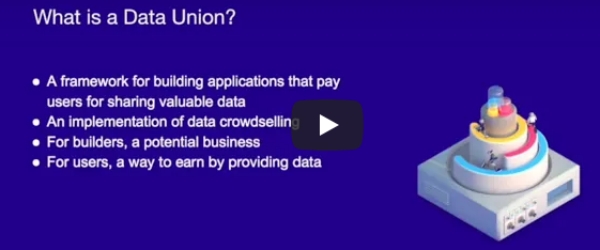A critique of data unions
Are YOU ready to “retail your data”?

I missed this when it came out, because it was during Italy’s lockdown: “What are Data Unions? How do they work? Which ones can I use?"
A Data Union is a digital service that “allows people to easily bundle and sell their real-time data and earn revenue”.
The reason to create and join Data Unions is that “On its own, our data does not hold much value, but when combined in a Data Union, it aggregates into an attractive product”.
This practice, called “crowdselling”, has the potential to “generate unique data sets by incentivising trade directly from the data producers”. Data Unions would be “the first convenient and scalable way for people to retail their digital information”.
Concretely, this means that those aggregated data may be used, quoting two examples from the article:
- by record labels “interested in knowing which songs users listened to before and after a certain song”
- by “by financial institutions, such as UnionBank, to conduct credit assessments, enabling them to provide microloans”
In such an economy, it is up to the individual to decide which Data Unions are permitted to sell their information, putting a greater emphasis on privacy, transparency, and user control, where there has been little to none in the past.
This, in theory…
In practice, this vision risks to introduce even more ways to intensify existing inequalities. In practice, the people with more data to sell will often be only the people who were already better off before Data Unions.
Not to mention that maybe certain things should not be for sale, period. For more on both these points, please read, and comment, my thoughts on limits and risks of “data as money”.
Who writes this, why, and how to help
I am Marco Fioretti, tech writer and aspiring polymath doing human-digital research and popularization.
I do it because YOUR civil rights and the quality of YOUR life depend every year more on how software is used AROUND you.
To this end, I have already shared more than a million words on this blog, without any paywall or user tracking, and am sharing the next million through a newsletter, also without any paywall.
The more direct support I get, the more I can continue to inform for free parents, teachers, decision makers, and everybody else who should know more stuff like this. You can support me with paid subscriptions to my newsletter, donations via PayPal (mfioretti@nexaima.net) or LiberaPay, or in any of the other ways listed here.THANKS for your support!